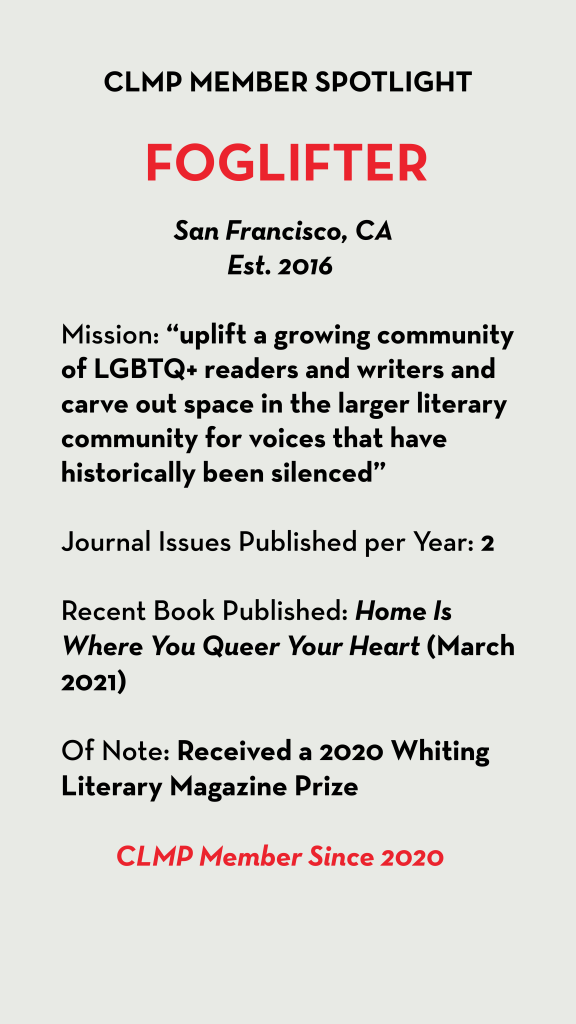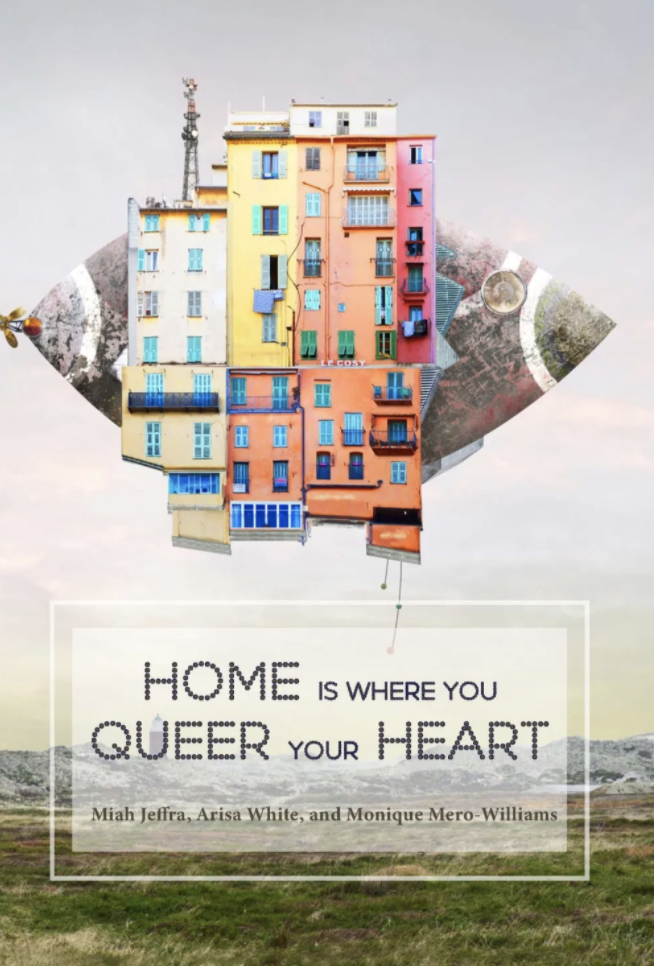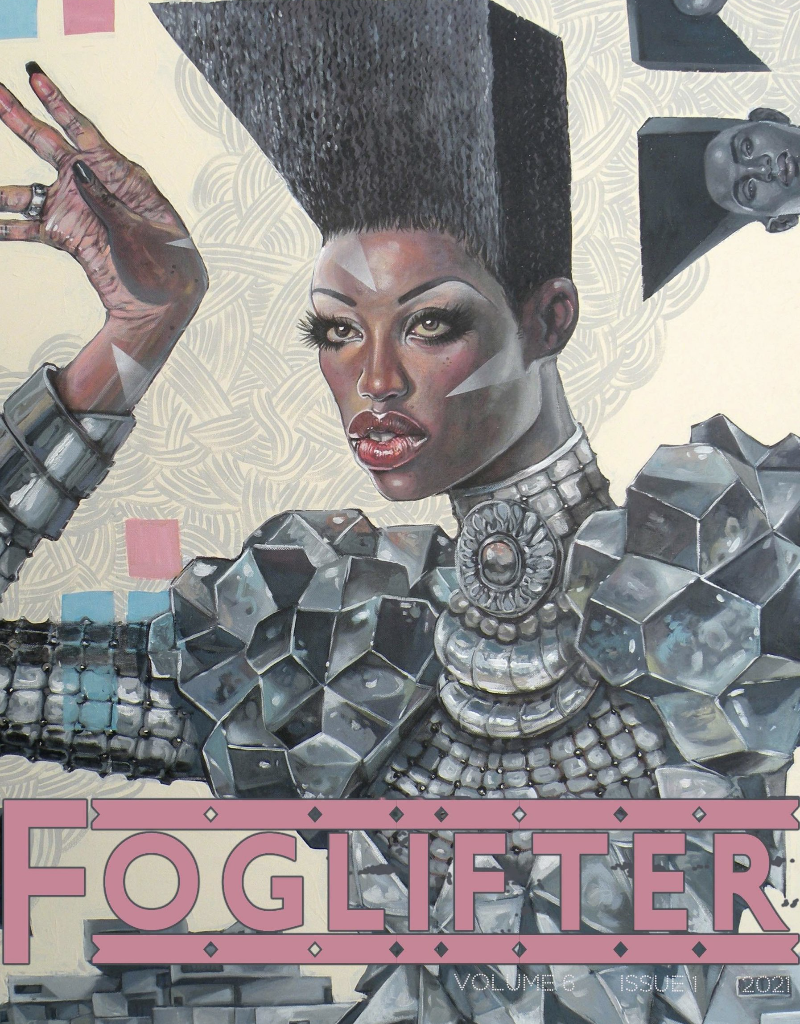We spoke with Miah Jeffra, cofounder of Foglifter, in this installment of the CLMP Member Spotlight series.
What is the history behind Foglifter? When was it founded and what is its mission?
 Foglifter was founded in 2016, inspired by my Lambda Literary Emerging Writers Fellowship retreat in 2014 and a series of conversations I had with Chad Koch, Foglifter’s cofounder. In general, we were dismayed by the publishing industry’s largely straight and cis supremacy, exhibited by the feedback we were getting on our own writing projects. Wherever there were complex queer content and perspectives in our work, publishers were requesting more of a recognizable character trajectory—a coming-out sequence or a discussion of the hardships of being queer. These publishers were requesting us to make our stories palatable for straight audiences. We realized that there needed to exist a literary space that focused on queer experiences for a queer readership. And when Charles Flowers’s literary project BLOOM went on hiatus, there were little-to-no American magazines we knew of specifically publishing solely queer and trans voices. We knew it was time to introduce one into the landscape.
Foglifter was founded in 2016, inspired by my Lambda Literary Emerging Writers Fellowship retreat in 2014 and a series of conversations I had with Chad Koch, Foglifter’s cofounder. In general, we were dismayed by the publishing industry’s largely straight and cis supremacy, exhibited by the feedback we were getting on our own writing projects. Wherever there were complex queer content and perspectives in our work, publishers were requesting more of a recognizable character trajectory—a coming-out sequence or a discussion of the hardships of being queer. These publishers were requesting us to make our stories palatable for straight audiences. We realized that there needed to exist a literary space that focused on queer experiences for a queer readership. And when Charles Flowers’s literary project BLOOM went on hiatus, there were little-to-no American magazines we knew of specifically publishing solely queer and trans voices. We knew it was time to introduce one into the landscape.
Why is it important to create a dedicated space for the growing community of LGBTQ+ readers and writers? How is Foglifter related to the ongoing tradition of this kind of work in the San Francisco Bay Area?
Queers are not a monoculture. They possess incredible nuance and dynamically varied sensibilities. However, with few exceptions, the industry has historically only published a small sampling of the vast queer spectrum, namely that which it deemed most legible—white, cis, male. As we see more representations of our lived experiences, however, there will be more opportunities to further articulate the immense diversity within our community. And with that, more platforms will be created to represent those varied experiences. It’s a snowball effect. The more we publish the unique perspectives along the queer and trans spectrum, the more publishers will be open to publishing them, and the more writers along the margins of the queer community—BIPOC, trans, variously abled, bisexual, asexual, et al.—will be introduced to readers who might actually see themselves represented in those perspectives. It contributes to the liberation of us all. We all benefit.
Foglifter collaborates with another CLMP Member, The Rumpus, to produce The Queer Syllabus. Can you tell us more about this?

One of our fiction editors, Wesley Cohen, conceived of this project with The Rumpus. The Queer Syllabus allows writers to nominate works for a new canon of queer literature. We asked writers from across the queer and trans spectrum to suggest titles and then explain why these works were so important to their development. When we identify our roots, when we point to the work that shaped us as writers and as people, we demonstrate that our stories are timeless, essential, and important—and so are we.
You’ve recently released a new anthology called Home Is Where You Queer Your Heart. How was the collection curated, and why did you choose to emphasize this idea of home?
 This was a project that myself and fabulous board members Arisa White and Monique Mero-Williams conceived of. At first we were interested in exploring the way queers began homesteading in the wake of a broader acceptance of (some aspects of) the LGBTQ+ community, beyond the queer cultural bastions of New York City, San Francisco, and Los Angeles. That quickly changed as current events rocked the country. I think we can say that the last few years have been quite stressful, even traumatic, for many people living in the margins of America. The rhetoric of the Trump regime, the Supreme Court appointments, the imminent threat of Obergefell being overturned, and then the pandemic, the pointed highlighting of ongoing systemic brutality and violence committed against black and brown bodies… how do queer and trans folx negotiate home when their nation has further precluded them from a sense of comfort? The anthology evolved into addressing this and many related questions as well. We listened to the times and to our community. And then we curated the book as a means to glean wisdom, to find healing in the pages. The best activism is inspired by love.
This was a project that myself and fabulous board members Arisa White and Monique Mero-Williams conceived of. At first we were interested in exploring the way queers began homesteading in the wake of a broader acceptance of (some aspects of) the LGBTQ+ community, beyond the queer cultural bastions of New York City, San Francisco, and Los Angeles. That quickly changed as current events rocked the country. I think we can say that the last few years have been quite stressful, even traumatic, for many people living in the margins of America. The rhetoric of the Trump regime, the Supreme Court appointments, the imminent threat of Obergefell being overturned, and then the pandemic, the pointed highlighting of ongoing systemic brutality and violence committed against black and brown bodies… how do queer and trans folx negotiate home when their nation has further precluded them from a sense of comfort? The anthology evolved into addressing this and many related questions as well. We listened to the times and to our community. And then we curated the book as a means to glean wisdom, to find healing in the pages. The best activism is inspired by love.
What are some other literary journals and small presses you admire that also promote the work of emerging and established LGBTQ+ writers?
I must give a shout out to Sibling Rivalry Press—such a generous organization for queer and trans voices, with a fabulous, soulful editorial team. Nightboat Books has been consistently excellent. Bold Stroke Books and Manic D Press have published some strong work and authors. Canada’s Plenitude has been a reliable literary space for solid queer writing. Gertrude often gets me excited. I was thrilled by Vetch‘s first issues, but I’m not sure they are continuing. While they don’t solely feature queer/trans voices, I’m very impressed with Nat. Brut. and newcomer Honey Literary. This question is tough to answer because so many promising enterprises fold quickly due to fiscal insolvency and the relentless gatekeeping of the publishing industry. It sucks, because some of the ones that have come and gone even during Foglifter‘s fledgling life were exciting.
Foglifter recently received a Whiting Literary Magazine Prize, which will be distributed over the next three years. What are some of your hopes and goals for this period, and how will this grant help you realize them?
 Simple: to provide support to our queer and trans writer community. We already pay contributors, pay readers for our events, and provide (albeit small) stipends for our editorial team. However, it is not enough. Writers are often paid very little unless they publish in The Atlantic or score a Big 5 book contract. Most of the writing we champion won’t be considered for these resources, at least for a long while, and not because it isn’t just as—if not way more—excellent and important. We want to do everything we can to support these writers so their writing can be made. It is hella tough being a visionary writer in this country. Foglifter‘s contribution might be small in this effort, but is fierce and fearless.
Simple: to provide support to our queer and trans writer community. We already pay contributors, pay readers for our events, and provide (albeit small) stipends for our editorial team. However, it is not enough. Writers are often paid very little unless they publish in The Atlantic or score a Big 5 book contract. Most of the writing we champion won’t be considered for these resources, at least for a long while, and not because it isn’t just as—if not way more—excellent and important. We want to do everything we can to support these writers so their writing can be made. It is hella tough being a visionary writer in this country. Foglifter‘s contribution might be small in this effort, but is fierce and fearless.
